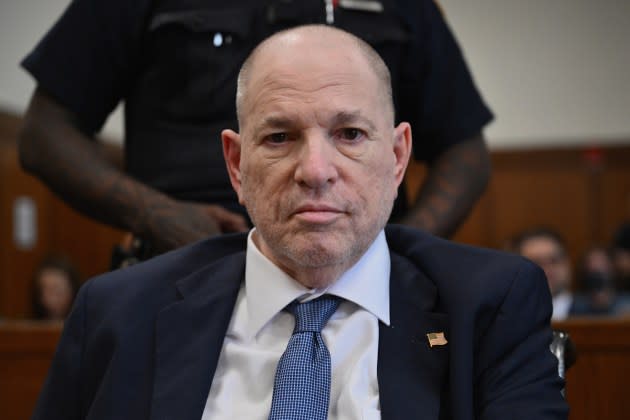Harvey Weinstein Prosecutors Say New Accusers May Testify in Retrial After Overturned Rape Conviction

More accusers may come forward to testify in Harvey Weinstein’s New York retrial this fall, prosecutors said in court. On Wednesday, the former movie producer appeared in a Manhattan courtroom a month after the New York Court of Appeals overturned his 2020 rape conviction.
Nicole Blumberg, Manhattan’s Assistant District Attorney, told the judge that “some people who were not ready to speak out in 2020” may now do so for the new trial. An exact date for the retrial has yet to be announced, but it’s expected to be sometime after Labor Day.
More from Variety
Harvey Weinstein Appears in New York Court After Overturned Conviction, New Trial Expected for Fall
Does Harvey Weinstein's Overturned Conviction Signal the End of Hollywood's #MeToo Moment?
Harvey Weinstein Hospitalized After Rape Conviction Overturned in New York
Weinstein arrived in the courtroom in a wheelchair and sported a shaved head. He gave a thumbs up to his colleagues as two security officers wheeled him in.
Blumberg asked Judge Curtis Farber that Weinstein’s lawyer, Arthur Aidala, refrain from making public statements about witnesses that may intimidate or discourage them from testifying. Prosecutors alleged last week that Aidala threatened Miriam Haley, who accused Weinstein of sexually assaulting her, by saying he would intensely cross-examine her if “dares to come and show her face here.” Aidala apologized if his words came across as intimidating, but said it’s his duty to “zealously” defend Weinstein as “mouth pieces for the D.A.’s office beat him up” and he became the “poster boy for an international movement.”
“Gloria Allred is having press conference beating up Harvey Weinstein,” Aidala said in court, motioning to the women’s rights lawyer sitting in the front row. “Who’s standing up for him?”
Aidala also objected to the prosecution’s use of the word “survivors” regarding new women who testify, arguing it is a “conclusionary term.” Judge Farber sustained the objection and advised both parties to not be influenced by the press and that the retrial will be “free from the court of public opinion.”
On April 25, New York’s highest court ruled in a 4-3 decision that the judge in Weinstein’s 2020 trial had allowed too many women to testify about allegations that were not part of the case. Weinstein’s 23-year sentence in New York was reversed, but he remains in custody due to his Los Angeles conviction; he was sentenced to 16 years in prison for sexual assault after a 2022 trial. For now, Weinstein will remain in New York ahead of his retrial as he rejected the extradition request to relocate him to California.
“At the time the jury was deciding the evidence in California, they were working under the assumption and the belief that he had properly been convicted in New York,” Jennifer Bonjean, the attorney who is handling Weinstein’s California appeal, told Variety. “Now we know that’s not true.”
Three women testified in the New York trial as “prior bad acts witnesses” to discuss Weinstein’s pattern of bad behavior and assault. The New York Court of Appeals ruled their testimony distracted the jury from the charges for which he was on trial, which led to the overturned conviction.
“We reaffirm that no person accused of illegality may be judged on proof of uncharged crimes that serve only to establish the accused’s propensity for criminal behavior,” wrote Judge Jenny Rivera in the court’s majority opinion. “It is an abuse of judicial discretion to permit untested allegations of nothing more than bad behavior that destroys a defendant’s character but sheds no light on their credibility as related to the criminal charges lodged against them.”
Weinstein’s next hearing is set for July 9.
Best of Variety
Sign up for Variety’s Newsletter. For the latest news, follow us on Facebook, Twitter, and Instagram.

